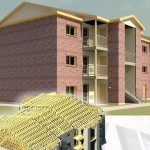 Construction administration plays a critical role in the seamless execution and completion of any construction project. It serves as the backbone for ensuring projects meet their intended design, budget, and timeline specifications. This component of construction management involves the oversight and coordination necessary to transform plans on paper into physical structures, while maintaining the highest standards of quality and efficiency.
Construction administration plays a critical role in the seamless execution and completion of any construction project. It serves as the backbone for ensuring projects meet their intended design, budget, and timeline specifications. This component of construction management involves the oversight and coordination necessary to transform plans on paper into physical structures, while maintaining the highest standards of quality and efficiency.
The Core of Construction Administration
The essence of construction administration lies in bridging the gap between the construction drawings or design intentions and the actual construction performed on-site. This process ensures that all specifications, materials, and systems are executed correctly and in compliance with regulatory requirements. Construction administration professionals are tasked with consistently overseeing project progress to mitigate potential issues that might arise during the building phase.
Key Functions and Responsibilities
1. Contract Administration: One of the primary duties involves managing the contracts between the client and contractors. This includes ensuring all parties understand the terms and adhere strictly to them. Contract administrators handle documents, approve payment requests, and maintain detailed records throughout the construction lifecycle.
2. Quality Control: Ensuring that all aspects of construction meet predefined quality standards is fundamental. This includes monitoring the installation processes and the materials used. Construction administrators conduct regular site inspections and coordinate with architects, engineers, and contractors to address any discrepancies between the drawings and the constructed elements.
3. Communication Coordination: Effective communication among all stakeholders is critical. Construction administration professionals facilitate meetings, provide updates, and act as the communication nexus between the project owner, design teams, and contractors. They resolve conflicts and ensure information is conveyed timely and accurately, helping prevent misunderstandings that could affect project outcomes.
4. Schedule and Budget Management: Monitoring the project schedule and budget is crucial. Construction administrators help keep the project on track financially and temporally, coordinating tasks and resources to avoid overruns. They review and approve changes to the construction plans that may impact the budget and schedule, maintaining a holistic view of project health.
5. Compliance and Safety Oversight: With in-depth knowledge of regulatory requirements and safety standards, construction administrators oversee compliance with all local, state, and federal regulations. They ensure that all safety protocols are followed on site, reducing risk and liability for all project stakeholders.
Challenges in Construction Administration
The role is not without its challenges. Construction administration involves constant problem-solving and adaptation. Professionals must be adept at negotiating conflicts between various parties, managing unforeseen circumstances such as delays due to weather, and handling budget constraints. Additionally, the intricate coordination of various technology systems and construction methodologies requires ongoing education and adaptation to new industry standards and practices.
Technology’s Impact on Construction Administration
In recent years, technology has significantly enhanced the efficiency and effectiveness of construction administration. Tools such as Building Information Modeling (BIM) allow for better visualization of projects, facilitating more accurate planning and execution. Software solutions manage documents, schedules, and communication channels more efficiently, ensuring everyone stays on the same page.
Why Effective Construction Administration Matters
Effective construction administration is indispensable in ensuring construction projects meet their objectives of quality, timing, and budget. By managing contracts, ensuring compliance, facilitating communication, and overseeing every detail, professionals in this field play a pivotal role in the built environment. As technology continues to evolve, it will undoubtedly further amplify the capabilities and impact of construction administration.
This administrative layer of construction is not just about oversight—it’s about proactive management and foresight that steer projects to successful completion, embodying the adage that good fences (or well-drawn plans) make good neighbors. Whether through the meticulous inspection of materials and workmanship or through strategic mitigation of project risks, construction administration remains a cornerstone of industry success.








